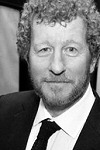 |
| |
MI6 examines the life and works of acclaimed British
novelist Sebastian Faulks, author of the James Bond
continuation novel "Devil
May Care"... |
|
Sebastian Faulks Biography
4th August 2008
Sebastian Faulks was born
to parents Pamela and Peter Faulks on the 20th of April
1953. Faulks was born and raised in Newbury where his
father was a lawyer and later a judge. While his grandmother
was an actress, his mother was an academic and
through her, Faulks was exposed to fine music and literature
at
a fairly young age.
Faulks graduated from a public school,
Wellington College in Crowthorne, Berkshire, and went
on to study for a B.A. (with honours) at Britain's prestigious
Cambridge University. For a long time
Faulks considered becoming a diplomat or politician;
instead the author-to-be elected to enter the literary
world after falling in love with the works of George
Orwell.
Out of college, Faulks took a teaching
position before trying his hand at writing - found in
the form of journalism for the Daily Telegraph and Sunday
Telegraph. By 1986, Faulks took an 'editor of
literature' position The Independent and quickly impressed
superiors.
He was recruited by the weekend paper, The Independent
on Sunday, where he served as the deputy editor for several
years.
Whilst working for the Daily Telegraph,
Faulks penned his first three novels. Two were rejected
by various publishers before, in 1984 and at age 31,
he scribed "A Trick of the Light" which found
acceptance at UK publishing house Bodley Head
- a division of Random House.
|
|

Datastream
Name: Sebastian Faulks
Date of Birth: 20th April 1953
Published: 1984-present
Bond Novels: 1
Beyond Bond: Noted author of "Birdsong",
famed for his research and historical detail. |
|
In 1989, Faulks' second novel, "The Girl
at the Lion d'Or" - one of his more commonly remembered
works - was published. The first of Faulks' French trilogy,
set in 1930s
France, "The Girl at the Lion d'Or" received critical
acclaim and Sebastian Faulks began to gain popularity, at least
among selected critics. The book is a heart-wrenching tale of
a doomed love affair but is often forgotten against the backdrop
of some of his more commercial successes. In 1991, Faulks left
his full time work with the presses to focus on his own writing
but still maintained a solid income
as a freelance author for The Guardian and The Evening standard
throughout the 1990s.
It was in his early days of writing that
Faulks was in discussions with his friend and noted author,
Bernard Cornwell. When Faulks asked what Cornwell had achieved
in the
last year, his response was that he had written and had published
two novels. In the same space of time Faulks admitted
to have revised a single chapter. Faulks is an author noted
for his patience and detail, taking the time needed to achieve
his desired outcome.
|
Above:
Faulks is best known for his work on World War II period
piece, "Birdsong".
|
Faulks' 1992 novel, "A Fool's Alphabet" -
which sees the lead character traveling Italy to find something
of himself and his past - failed to wow the critics but fame
was just around the corner. A year later Faulks received
his place in the bestseller's charts with his novel "Birdsong".
Undeniably his most widely remembered work, the novel marked
Faulks' second entry to his hailed French trilogy and jumped
time-periods to tell the stories of a World War I soldier, Stephen,
and his
granddaughter.
The final entry to his French trilogy, "Charlotte
Grey", explores the life of a young Scottish girl who gains
involvement with the French Resistance during the Great War.
In 2001, Cate Blanchett took the title role in a film adaptation
of Faulks' novel.
|
|
In his career as an author, Faulks has always
elected to tackle some controversial and emotional topics:
from the brutality of the First World War in "Birdsong",
to the treatment of the mentally ill in Victorian England
in "Human
Traces". Faulks has not been a penman to shy away from
the dark corners of British history. With a deep understanding
for his subject matter and a measured patience, Faulks has
been hailed for his often shocking but always realistic narrative.
Since 1984, Faulks has published
eight novels of fiction and one non-fiction exploration. "The
Fatal Englishmen" - his non-fiction work - charts great
British 20th Century figures who have fallen into obscurity,
inviting readers to remember these historical men and women
of acclaim. Faulks has often been tied closely to historians
of war and confirmed this when he wrote and presented a Channel
4 special entitled "Churchill's Secret Army".
|
Above: Sebastian Faulks and "Devil
May Care" cover-model Tuuli Shipster
In 2008, Faulks dabbled in the world
of James
Bond. Taking his place as the seventh officially
sanctioned author to continue the fiction of 007. Despite
some harsh reviews, Faulks does his best to emulate the timely
author and Bond creator, Ian
Fleming. Faulks' adventure "Devil
May Care", picking up where Fleming left off, sees
007 travel to the Middle East to hunt down a corrupt drug lord
and prevent his insane plan to topple Britain.

Above: Sebastian Faulks at the
launch of "Devil May Care"
|
In 2002, he was appointed with the title Commander
of the British Empire (CBE) and given status as a fellow of the
Royal Society of Literature. In 2007, Faulks was elected
to be an honorary fellow of Emmanuel College, his old house at
Cambridge. It is fair to say that Cornwell must be proud of his
old friend and the impressive career he has charted so far.
Related Articles
 Biography
Biography
 Literary
Coverage
Literary
Coverage
 Literary
Articles
Literary
Articles